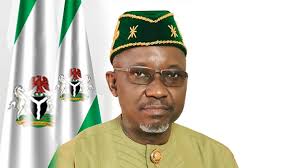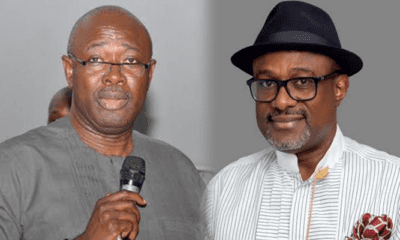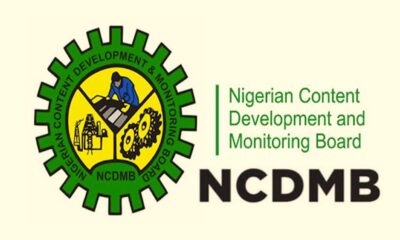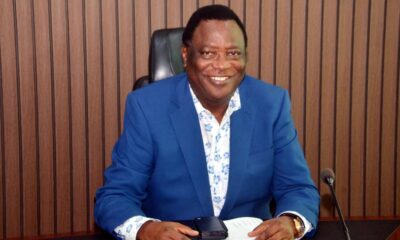News
Winners emerge in NCDMB National Essay Competition, as Board harps on in-country value addition
Winners of the 7th Nigerian Content Annual National Undergraduate Essay Competition, 2023, were unveiled on Wednesday at the Lady Daima Memorial Event Center, Yenagoa, Bayelsa State at a well-attended ceremony. It was the Grand Finale of the competition, with the top 10 finalists awarded prizes.
Overall best was Miss Iruoma Favour Lazarus, a 200-level student of the Faculty of Law, Nnamdi Azikiwe University, Awka. She received a cheque for one million naira (N1,000,000.00) and an HP laptop.
The second prize went to Miss Lucy Agbalu, a 100-level student of Microbiology at the University of Calabar, who had a cheque for seven hundred thousand naira and an HP laptop, while the third prize was won by Akinduyite O. Samuel, who received five hundred thousand naira and a similar laptop.
In an address to the “Award and Prize-giving Ceremony,” the Executive Secretary, Nigerian Content Development and Monitoring Board (NCDMB), Engr. Simbi Kesiye Wabote, said the Board seeks to “inculcate local content consciousness among students of our higher institutions,” thereby creating champions of such an endeavour.
He described local content as “an existential necessity for every nation, particularly for developing nations like Nigeria.” That much was evident from the resilience of Nigeria’s oil and gas industry in the face of the COVID-19 pandemic in 2020/2021.
The NCDMB boss noted that the topic of the essay competition, which was ‘Nigerian Content and the Lessons from COVID-19,’ was well-conceived “considering how the COVID-19 pandemic devastated our world.” He said at the height of the pandemic, “the movement of persons and goods was disrupted for several months, forcing every nation to rely on their local resources for survival.”
According to him, “The Nigerian oil and gas industry survived that period because of the huge local human and infrastructural capacities we had developed since the enactment of the Nigerian Oil and Gas Industry Content Development Act in 2010.” Efficient implementation of the Act, he pointed out, “ensured that Nigeria’s oil production continued without interruption, even when all the expatriates had left the country.”
Engr. Wabote, who was represented by the Manager, Corporate Corporations, Barr. Esueme Dan Kikile, called on policy-makers at different levels of government and in the private sector to take deliberate steps “to develop resilient and sufficient human and infrastructural capacities in key sectors of our national fabric, which can withstand any external shocks in future.”
While commending winners of the essay contest and the consultants, Mahogany Century Concepts Limited, he said the Board has sustained the competition for seven years because of the huge importance it attaches to it, and that the intention is to challenge students in tertiary institutions to sharpen their writing skills and engage youths in productive activities.
The annual essay competition is one of several initiatives of the NCDMB designed to benefit the youth segment of the Nigerian population. Others include the ‘Integrated Institutional Strengthening and Upgrade,’ under which the Board has undertaken and completed massive renovation of technical workshops and installation of world-class facilities in institutions like Government Technical College, Amoli in Enugu State, Government Technical College, Abak in Akwa Ibom State, Government Technical College, Port Harcourt, and the University of Ibadan Vocational School.
The Chairman of the occasion, Professor Allen A. Agih, in his opening speech, commended the NCDMB for its remarkable contributions to capacity building in the country. He corroborated the point made by the Executive Secretary on how the resiliency of the oil and gas industry withstood the pandemic, stating, “Nigerians did not run to foreign countries when COVID-19 struck.” He was represented by Mr. Fibainonine G. Paulley.
Chief Executive Officer of Mahogany, Mr. Eyinimi Omorozi, thanked the Executive Secretary and Management of the NCDMB for the sponsorship of the essay competition and contribution to national development.
News
Tinubu appoints governing board members for 111 tertiary institutions
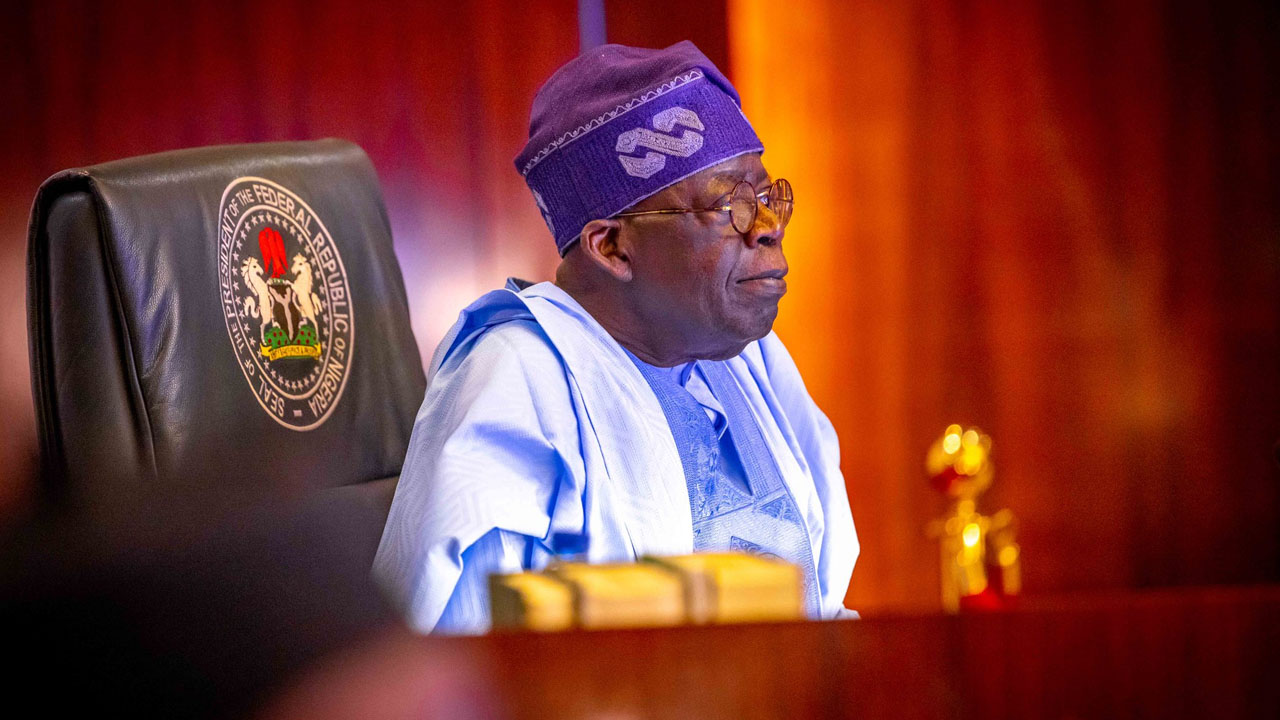

President Bola Tinubu has approved the appointments of at least 555 persons to serve as Pro-chancellors/Chairmen and members of Governing Boards of 111 federal universities, polytechnics and Colleges of Education.
This followed Tinubu’s assent to a list of nominees selected by the Ministry of Education.
It was signed by the ministry’s Permanent Secretary, Mrs. Didi Esther Walson-Jack.
“The inauguration and retreat for the Governing Councils will take place on Thursday, May 30 and Friday, May 31, 2024, at the National Universities Commission, 26 Aguiyi Ironsi Street, Maitama, Abuja. Both events will commence at 9:00am daily,” said Walson-Jack.
When contacted for confirmation, the Presidency said the list emanated from the Ministry of Education.
“This is from the Federal Ministry of Education…they make the nominations and forward them to the President to sign. But they are at liberty to release it from their end,” the President’s Special Adviser on Information and Strategy, Bayo Onanuga, told our correspondent on Saturday.
The appointments come days after the Academic Staff Union of Universities had threatened to embark on another strike, potentially disrupting the academic calendar and causing further setbacks in the country’s higher education sector.
The union, on Tuesday, decried the failure of the Federal Government to appoint Governing Councils for federal universities.
The union also faulted what it described as the nonchalant attitude of the President Bola Tinubu-led Federal Government to matters about academics in federal universities.
The body of academics, during a briefing at the University of Abuja, also faulted the 35 per cent salary increment for professors and the 25 per cent salary increment for other academics in the university system.
News
APC will take over Osun in 2026 – Oyetola
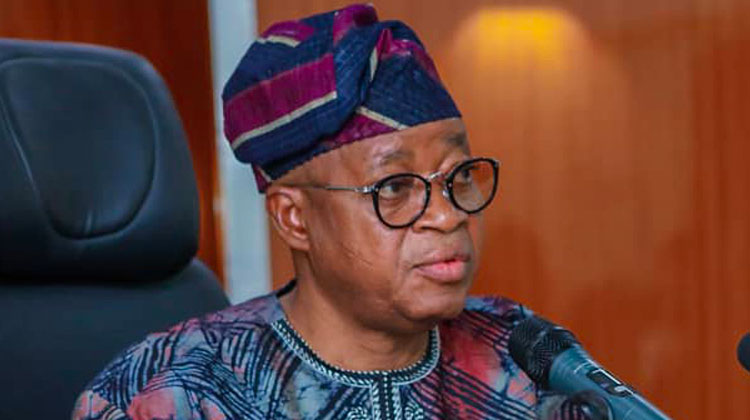

Minister of Marine and Blue Economy, Adegboyega Oyetola, on Friday in Osogbo declared that the fortune of the ruling Peoples Democratic Party in Osun State had nosedived in the state with the gale of defection that hit its rank.
Oyetola, the immediate past governor of the state, spoke at a rally organised to receive PDP ex-National Deputy Chairman, Alhaji Shuaib Oyedokun and ex-governorship aspirant on the platform of PDP, Mr Dotun Babayemi and their supporters into APC.
The ex-Osun State governor, who expressed confidence in the party winning the state in the next governorship election, said the defection into the party by Babayemi and his people was an indication that more people from the ruling party would join APC from the PDP before 2026 gubernatorial poll.
He further said, “It is an irony that we lost an election over a year ago and there has been no major defection from the party. What we have is the reverse. It is the ruling party that is coming to us, which shows that APC remains a party to beat. We have done so well, and people are starting to see that when it comes to governance, the progressive knows how to.
“The way President Tinubu has been governing us, that is what the APC governors in their respective states have been doing. I am delighted by the fact that we are not just getting anybody, but people of substance. Like Baba Suaibu, he is a veteran member of the PDP, decamping to the APC. It shows that PDP doesn’t exist any longer here.
“I am confident that in 2026, we are going to take over the state. This is just the beginning because several people are willing to come back to us, and a lot of political heavyweights are coming to join us. I welcome Dotun Babayemi and Alhaji Suiabu Oyedokun to the progressives,” he said.
Also speaking at the event, Babayemi who said good governance had ceased in Osun after Oyetola exited office, added that the present governor, Ademola Adeleke, lacked understanding of how to run a government.
He “The last time we witnessed good governance was in 2022 when Oyetola left government and it is time we unite to send the present administration out of government house for the sake of the state’s development.”
Reacting in a statement, Osun PDP chairman, Sunday Bisi, described Babayemi and others defection into APC as “a drama by the opposition APC to shore up its bad fortunes in Osun State.”
The party urged Osun people not to lose sleep over the “formal realignment of some political traders, whose round-tripping business of feeding fat on the common patrimony of the state was decisively halted through the July 16, 2022, governorship election.”
“The PDP believe the inglorious antecedents of the disillusioned dramatis personae involved in the soap opera of self-pleasuring are in public court. Such individuals like Mr Dotun Babayemi and his ilk have since been put in their place long before now and have ceased to be members of our party right before the 2022 governorship election,” it stated.
News
Nigeria to end fuel imports by June – Dangote
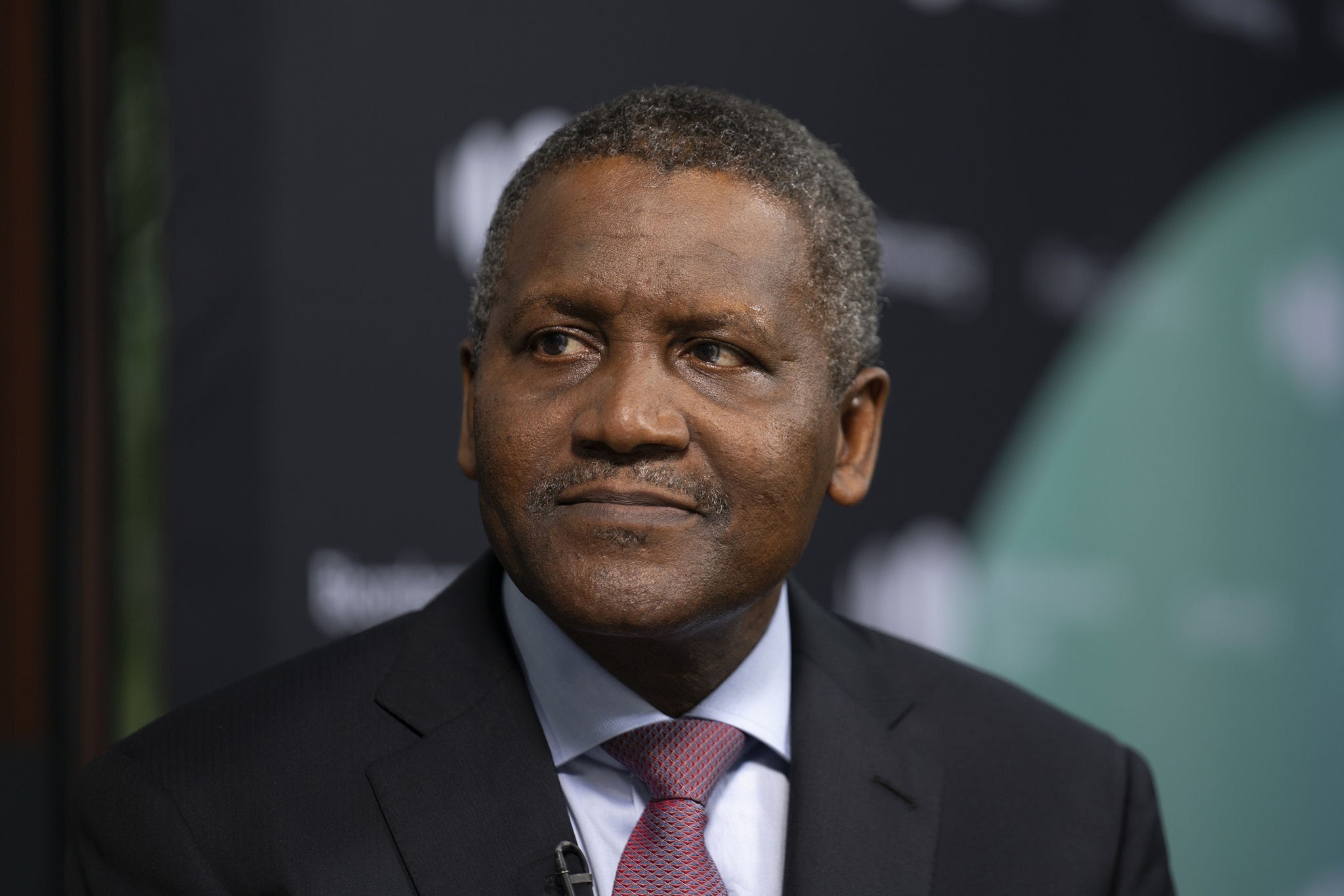

Africa’s richest man and Chairman of the Dangote Group, Aliko Dangote, has said that following the laid-down plans of the Dangote Refinery, Nigeria will no longer need to import gasoline starting next month.
Dangote also stated that his refinery can meet West Africa’s petrol and diesel needs, as well as the continent’s aviation fuel demand.
He spoke at the Africa CEO Forum Annual Summit in Kigali on Friday, expressing optimism about transforming Africa’s energy landscape.
“Right now, Nigeria has no cause to import anything apart from gasoline and by sometime in June, within the next four or five weeks, Nigeria shouldn’t import anything like gasoline; not one drop of a litre,” he declared.
He also outlined progress made by the oil company to ensure that Africa as a continent becomes self-sufficient when it comes to the energy sector.
He said, “We have enough gasoline to give to at least the entire West Africa, diesel to give to West Africa and Central Africa. We have enough aviation fuel to give to the entire continent and also export some to Brazil and Mexico.
“Today, our polypropylene and our polyethene will meet the entire demand of Africa and we are doing base oil, which is like engine oil, we are doing linear benzyl, which is raw material to produce detergent. We have 1.4 billion people in the population, nobody is producing that in Africa.
“So, all the raw materials for our detergents are imported. We are producing that raw material to make Africa self-sufficient.
“As I said, give us three or a maximum of four years and Africa will not, I repeat, not import any more fertilizer from anywhere. We will make Africa self-sufficient in potash, phosphate, and urea, we are at three million tonnes and in the next twenty months, we will be at six million tonnes of urea which is the entire capacity of Egypt. We are getting there.”
Dangote also went further to outline the achievements of the company since the commissioning of the refinery in February.
“For some of us, despite the boom of the capital market of the US, you know, Google, Microsoft and the rest, we didn’t participate, we took all our money and invested in Africa.
“We had this dream, just about five years ago and we said we want to move from five billion (dollars) revenue to thirty billion revenue and we made it happen. It is possible and now we have made it happen and now we have finished our refinery.
“Our refinery is quite big, it is something that we believe that Africa needs. If you look at the whole continent, there are only two countries that don’t import petroleum products which is a tragedy. They are only Algeria and Libya. The rest are all importers,” he said.
He added, “So, we need to change and make sure that we don’t just go and produce raw materials, we should also produce finished products and create jobs.
“One of the things we also need to know as Africans is that we produce raw materials and export them when you export raw materials and somebody now keeps importing things into your continent and dumping goods. what you are importing is poverty and exporting jobs. So, we have to change that narrative.”
“We just commissioned in February and now we are producing jet fuel, we are producing diesel and by next month, we will be producing gasoline. What that would do is that we would be taking most of the African crude that is being produced and also be able to supply not only Nigeria, because our capacity is too big for Nigeria, but it would also supply West Africa, Central Africa and also South Africa. We have 650,000 barrels per day, 1 million tonnes of polypropylene, we have 590,000 carbon black, that is the raw materials ink, dyes and co. We are expanding more. This is the first phase and we are going out to the next phase which will start early next year,” he said.
The richest man in Africa also acknowledged the challenges faced in building the refinery, particularly by those accustomed to the status quo.
He said there was pushback but failure was not an option, even though many people did not believe he would succeed.
“The pushback was very impactful because there are people who have been used to just making money trading without refinery and you know, to get people who are committed to Africa has to be people that believe in investing in Africa because the companies that are operating today are not investing, and some of the issues of stopping that investment is going to impact us, not today but in the future, which means our oil production will continue to go down because in oil unless you keep investing, the production is going to go down.
“So, that is the issue. The major burden on us was that there is no room for failure because we were the EPC contractors and ninety per cent of people never believed that we were going to deliver but we have been able to deliver now,” he added.
Despite these achievements, Dangote identified policy inconsistency as a major challenge for African entrepreneurs and called for a review and support from the leaders to ensure proper ease of trading in the continent.
-
Finance4 months ago
Court orders Sen. Victor Umeh to repay N136m bank debt to AMCON
-



 Abuja Update3 months ago
Abuja Update3 months agoUNDP, FG partnership needed to achieve inclusion, equity- Minister
-
capital market2 years ago
Rt.briscoe, FBNH, Others halts negative performance of stock market
-
Abuja Update2 months ago
Banks drive stock market performance with N147bn gain
-
Submission Guidelines4 months ago
CALL FOR SUBMISSIONS: POETRY COLUMN-NND
-



 Health1 month ago
Health1 month agoCapacity training will reduce migration of health workers- NPHCDA
-



 Business4 weeks ago
Business4 weeks agoTingo Group unveils Tingo Electric, Tingo Cola drink at Lagos launch
-
News4 months ago
Oil thieves sponsoring malicious media campaign against Navy – Spokesman



